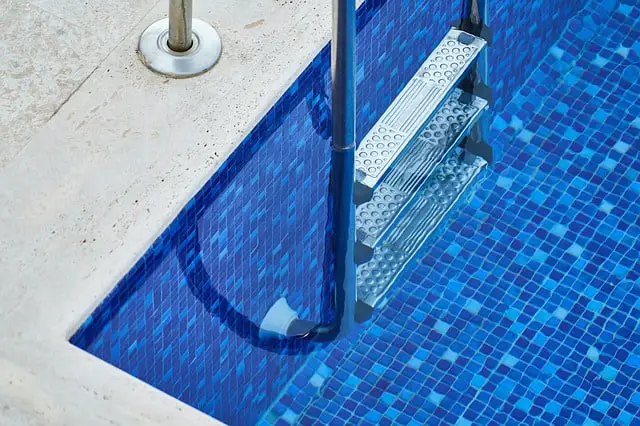As a saltwater pool owner, maintaining the proper chemical balance in your pool is essential for keeping the water clear, safe, and comfortable to swim in. One important factor to consider is total hardness, which refers to the amount of dissolved minerals, such as calcium and magnesium, in the water.
It’s important to note that total hardness is not the same as total dissolved solids (TDS). Total hardness is concerned with dissolved minerals like calcium and magnesium in the water whereas TDS includes all solids, both organic and inorganic. In that regard, TDS is a more complete calculation.
In this post, we’ll answer some of the most common questions that saltwater pool owners have about total hardness, including what the ideal range is, how often it should be tested, and what factors can affect it.
Top 10 Total Hardness FAQs
- What is total hardness in a saltwater pool?
Total hardness is a measurement of the amount of dissolved minerals, such as calcium and magnesium, in the water. These minerals are essential for maintaining the structural integrity of the pool, but too much or too little can cause problems.
If you’re familiar with the differences between hard water and soft water in your home, you’re on track to learning about total hardness in your pool.
- What is the ideal range for total hardness in a saltwater pool?
The ideal range for total hardness in a saltwater pool is between 200 and 400 parts per million (ppm). If the total hardness is too low, the water can be corrosive, which can damage the pool’s surfaces and equipment. If the total hardness is too high, it can lead to scaling, which can cause staining and other aesthetic issues.
Sometimes you hear it referred to as calcium hardness since calcium (and magnesium) tend to be the hard minerals found in water that can cause trouble for pools as well as water-using items in your home, often necessitating the use of a water softener.
As with other water factors in your pool, it’s a balancing act to ensure that water chemistry is in line at all times.
- How often should I test for total hardness in my saltwater pool?
You should test the total hardness of your saltwater pool at least once a month, and more frequently if you notice any changes in the water’s appearance or if you add any new chemicals to the pool.
While you can test for total hardness yourself, you may also choose to bring water samples to your pool company if they are willing to test it for you since they can also alert you to other potential problems in your water.
- What factors can affect the total hardness of a saltwater pool?
Several factors can affect the total hardness of a saltwater pool, including the type of pool surface, the pH level of the water, the type of sanitizer used, and the amount of water added to the pool.
How hard is the water in your local area? If you live in an area with very hard water, you might have more difficulties than a person with a pool in an area with less hard water.
If you experience hard water, one option (at a cost of course) would be to get water trucked in to fill your pool rather than using a tap from your local water source.
- How can I raise the total hardness of my saltwater pool?
To raise the total hardness of your saltwater pool, you can add a calcium hardness increaser, which is available in granular or liquid form. Follow the manufacturer’s instructions carefully, and be sure to test the water again after adding the product.
- How can I lower the total hardness of my saltwater pool?
To lower the total hardness of your saltwater pool, you can dilute the water by adding fresh water to the pool. However, this should be done carefully, as adding too much fresh water can throw off the chemical balance of the pool.
- Can high total hardness cause skin irritation or other health problems?
No, high total hardness is not a health hazard, but it can cause scaling and staining, which can be unsightly and difficult to remove.
- Can low total hardness damage my pool equipment?
Yes, low total hardness can make the water corrosive, which can damage the pool’s surfaces and equipment over time.
If you have a pool ladder (metal) or other metal in the framing of the pool or near the poolside, it can get damaged over time with overly hard water.
- What is the best time of day to test for total hardness?
It is best to test for total hardness in the morning or early afternoon, before any chemicals or other substances have been added to the pool.
- What other chemicals should I test for in my saltwater pool?
In addition to total hardness, you should also test the pH level, chlorine level, alkalinity, and stabilizer level of your saltwater pool on a regular basis to ensure proper chemical balance.
Final thoughts
Total hardness is an important factor to consider when maintaining the proper chemical balance in a saltwater pool. By testing for total hardness regularly, adjusting it as needed, and staying informed about the factors that can affect it, you can keep your pool looking and feeling its best all season long.

